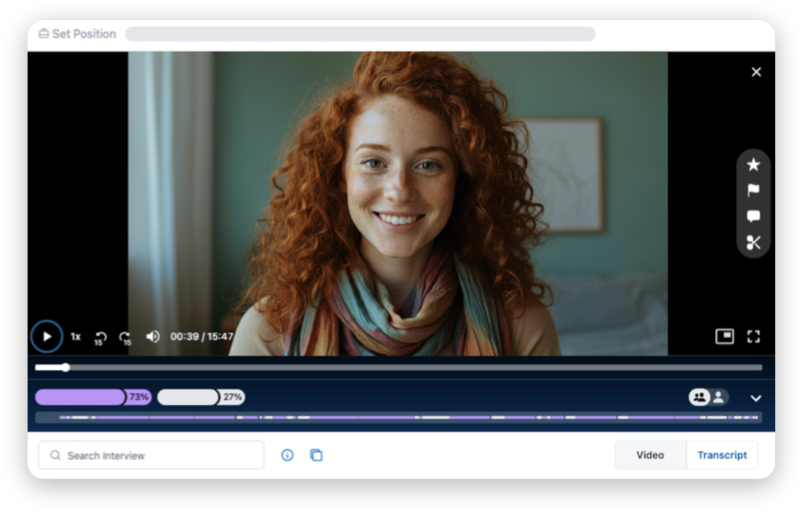Interviewers often ask about your weaknesses during interviews, and many of us find this question difficult to answer. A good way to prepare for this question to have a ‘sample answer’ ready before your interview. We advise that your sample answer should contain around five weaknesses that you can discuss as needed during the interview depending on exactly how the interviewer asks the question. (For example, the interviewer might ask for 3 examples of your weaknesses). The interviewer might also ask you how you would improve on these weaknesses that you have identified, so think of some examples on how to answer that question as well.

What are your Weaknesses?
In order to help you start preparations for this question, we have provided a list of weaknesses below. You can read through these and highlight the ones that you identify within your own life. The first step is displaying self-awareness by being able to identify your own weaknesses. The next step is to show how you have used your personal strengths to make improvements to your personal weaknesses.

List of Weaknesses
While the main focus of this article is on weaknesses, it might be best to conduct this exercise for both strengths and weaknesses before attending an interview. Preparing to answer these questions ahead of time makes it easier to give the best answer you can during the interview process.
We have provided a list of weaknesses that you can look through to help you prepare a sample answer for this kind of self-awareness question in the future.
- I do not function well under pressure.
- I am unorganized.
- I am not very open-minded.
- I do not work well in teams.
- I am critical of myself.
- I tend to be fearful.
- I am a perfectionist.
- I have trouble focusing on new projects outside my comfort zone.
- I do not maintain a healthy work-life balance.
- I am very passive.
- I am overly critical of others.
- I enjoy taking risks.
- I tend to be aggressive.
- I take on more than I can manage.
- I can be quite bossy.
- I am impulsive.
- I struggle with public speaking.
- I can be quite blunt.
- I am over-emotional at inappropriate times.
- I am not good at multitasking.
- I can be quite stubborn.
- I need to be right.
- I am not good at delegating tasks.
- I can sometimes hyper-focus on small details.
- I can sometimes be selfish.
- I can be short-sighted at times.
- I am quite strict with my team.
- I struggle with long-term planning.
- I am too shy.
- I avoid conflict.
- I am not good at taking criticism.
- I procrastinate
- I am easily bored.
- I am lazy.
- I can be impatient.

Beyond identifying your weaknesses
An interview question related to personal strengths and weaknesses can be expected and is an excellent opportunity to show self-awareness. Honesty and integrity are usually appreciated when answering this kind of question. However, you are not required to go into a lot of detail in your answer – be concise but clear. Furthermore, if the hiring manager does not specify how many weaknesses to address, start out by only highlighting one weakness.
Job interviews can be very stressful, and some of us tend to rely on common weaknesses instead of paying attention to our own personal weaknesses. This makes it difficult to construct better answers than anyone else will likely give.
It is not always enough just to know what your weaknesses are; you also need to know how to express them during a job interview. This forms part of essential soft skills related to finding a job.
It is best not to avoid the question, but instead to prepare a sample answer ahead of time. This sample answer needs to be adaptable depending on nuances in the question. In order to provide the interviewer with the bigger picture, pick weaknesses that you have made improvements to in the last few months.
Here are some other steps that can be taken to improve your interview skills and experience:
- Practice answering the questions.
- Research the company.
- Arrive early.
- Dress appropriately.
Remember, your answer to an interview question, especially related to your greatest weakness, relies on three steps: first is to identify the weakness, then to state the weakness clearly, and explain how you have addressed this weakness.
Questions about strengths and weaknesses are very common in job interviews as it allows employers to see how people tend to respond under pressure and gives them an idea of their work style. It is best not to give cliche and predictable answers – provide real weaknesses which you are working on to improve.
For example, people who have a hard time delegating tasks will struggle with heavy workloads. The ability to delegate tasks is one of the important skills that help employees to meet deadlines. Other employees might have a hard time multitasking which can also impact their workload. These kinds of skills are viewed as positive qualities in a professional setting, and indicating that you are working on improving these areas shows that you are developing your skills to improve at a professional level.
It is best not to say that your biggest weakness is that you are a perfectionist. This is an answer that employers are tired of hearing and know is almost never accurate. It also might suggest that you have unrealistic expectations of coworkers, which might challenge the company culture.
A real weakness is a better answer than a common weakness and does not need to suggest something negative about an employee. Employers realize that you still need to grow in your new position and would not be using the exact same skill set that you did in your last position. You will develop your skills to the optimal level during your tenure in your new position, so the best answers to this question take the big picture into account and show room for growth – not perfection.

Classify Your Weaknesses
There are five categories of weaknesses to note during a job interview.
A Personal weakness is something related to your personality that might not be ideal. For example, weaknesses related to punctuality are considered to be elements of your personal life.
A Knowledge-based weakness happens when you are out of touch with a specific element of your training or expertise. This can usually be fixed with training or education.
Technical weaknesses are related to not knowing how to use a piece of technology or tool. This can also be fixed with training.
Situational weaknesses are related to situations in your personal life that are present during your job interview. They may influence your ability to perform at the given moment, but it is not a permanent situation. Deciding to disclose something like this during a job interview is a personal choice.
Environmental weaknesses are related to elements within the working environment, for example, the company culture. While these weaknesses are not the best weaknesses to address in an interview necessarily, they are fixable.
Whatever weakness you decide to bring up during an interview, even when related to your skills, you should not make excuses. Let the interviewer know that you are aware of this weakness and you are working on it in the following ways. As far as possible, be concise with your answer, and do not embellish.
When it comes to constructing your improvement plan for your sample answer, you should take the following steps:
- Conduct research, see what the trends are, etc.
- Know what to expect from the interview and the position you are interviewing for.
- Show the interviewer that you are detail-oriented and that you are ready to give this job your all.

Turning Your Weaknesses Into Strengths
When an interviewer asks what your greatest weakness is, there is not really any right way to answer, and no good response to give. It can sometimes also be difficult to judge what the interviewer is looking for in a response. Many employers might well have their own expectations for what they want you to say. One strategy that people often try to work into this question is to turn their weaknesses into a strength. For example, instead of saying that you have trouble meeting deadlines, explain that you take your work seriously and want to make sure that you offer the best possible result, which sometimes impacts your deadlines. But be careful when doing this so that your answer does not sound too rehearsed.
You can also choose to provide an example of overcoming a previous weakness that you had. For example, how you attended training and went about overcoming your fear of public speaking, or how you developed healthier ways to improve yourself than through self-criticism.

Avoid Revealing Too Much
Remember that an interviewer will not want to hear negative self-talk. They are usually not specifically interested in your weaknesses, so do not go into too much strenuous detail – rather make sure that your answer shows that you take a strength-based approach to self-improvement.
Another point to remember is that the interviewer likely does not want to know why you think those weaknesses have come to be in your life. Their focus is almost always proactive and would not involve detailed instructions or analysis of past events or future plans. What are you doing now? Is it working?
Most interviewers know that the perfect candidate does not exist. They are often looking for someone who has something unique to bring to the mix and someone who will grow and strengthen their professional skills over time.

Consider the Job Description
It is always important to have a good understanding of your strengths and weaknesses in any field. Interviewers will try to establish how you measure up to other candidates in terms of the practical elements of the job you have applied for. They want to see where there is room for improvement and where current skill sets are limited. Spending time studying and understanding the job description and knowing what will be expected of you is beneficial to your interview experience.
The company is concerned with success. Take time to ensure that your answers focus on the company’s needs and not your personal needs. The interviewer wants to see that you understand the role you are applying for and that you have the company’s needs in mind when thinking about success.
Ultimately, one of the most important things to remember about job applications or interviews is never to lie outright, especially not about your skill set.










